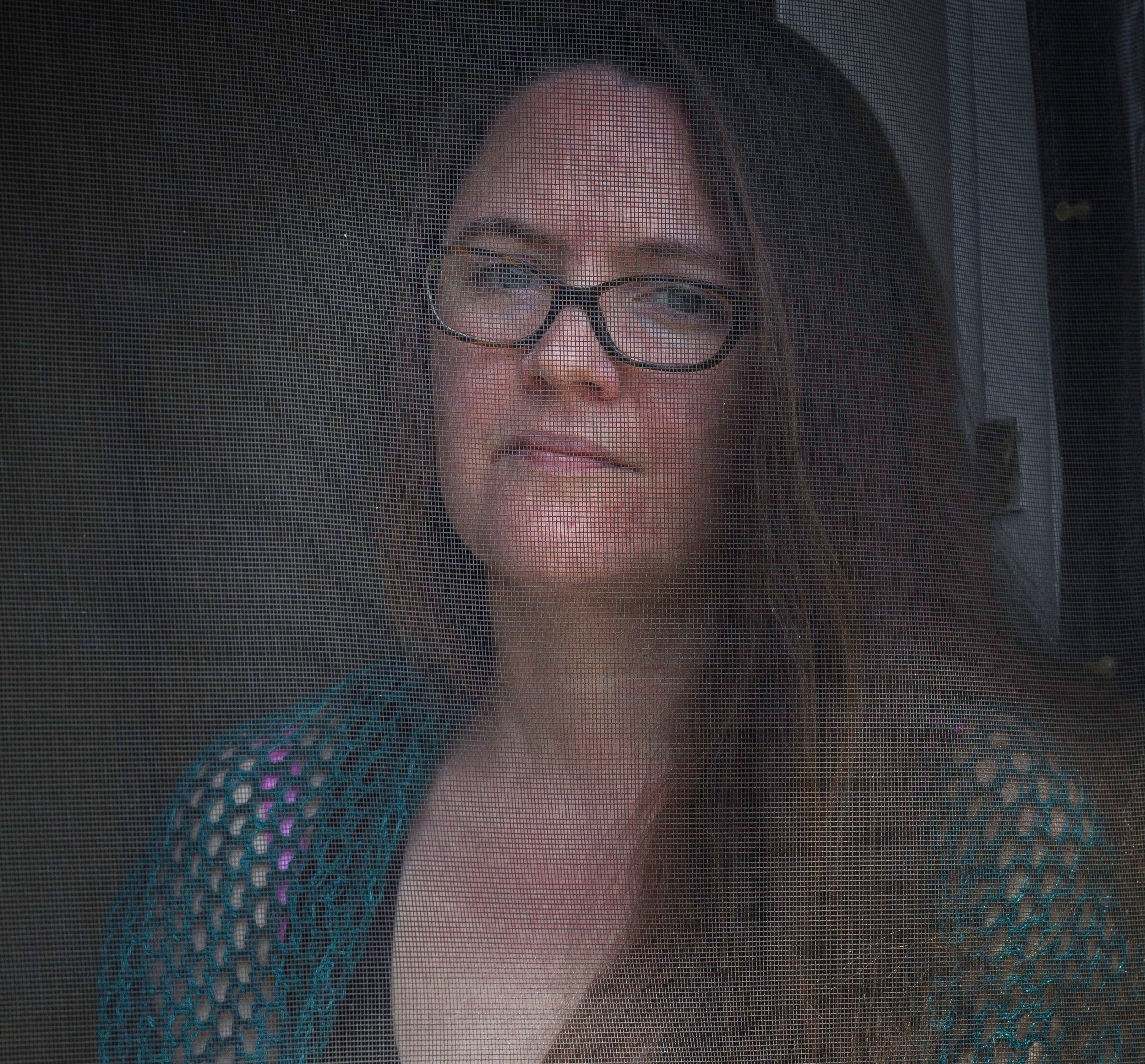D.A. Rivera
The night had begun to descend low. Streaks of cool oranges and arid purples were sent
scraping across the sky. The colors draped as a fading contrast to the darkening waves of sand,
terraced steppes, and plumes of stone in the surrounding desert. A babbler, readying itself to
roost for the night, connected the horizon in its search. In its beak it carried what little it
scavenged from the day. Overhead, a fan-tailed raven scanned the landscape, fighting the night
searching for its closing meal. It set itself down having failed to find what it was looking for. The
babbler saw it, turned, and hopped to the raven before gently setting on the ground the only seed
it had collected from the day. The babbler raised its bill and quickly preened its belly’s feathers,
softening its features. The raven glanced at it, piloerected its feathers, and flew off into the night,
leaving the seed behind. Instead of returning to nest, the babbler remained nestled against the
seed, awaiting the raven’s unknowable return.
And as all else prepared for sleep, the man continued to sit.
He sat. Straight back, leaning forward, forearms on his thighs. You could tell he was
hungry, starving even. His face stared at the small fire he ignited but moments ago. Dry eyes
peered over sand spattered cheeks and flaking skin. He shivered as he prodded the flame with a
stick taken from a tamarisk tree he had long since passed. The saltbush that had shared its soil
now provided the kindling that fueled the wisp before him. The little yellow of the flame held
against the night’s impending darkness.
“If you insist on sticking around the least you could provide is your conversation.” The
man said while looking up. The warm beard on his face and shoulder-length hair paled in
comparison to the warmth of his smile. That softly curved smile somehow continued to linger as
he turned back to the flame and again, gently prodded it with a stick.
“I had thought after offering you the world you would find our conversation exhausted.”
The other replied, his eyebrow arcing in response. The other stood on the outskirts. He stood tall,
defined, and profound. His chest was a boulder, his shoulders rose as mountains. Despite the
other’s prominence the darkness around blended with him. His form flickered with the shadows
of sleeping shrubbery and nestled rocks. They followed along in chorus to his melody; his form
the conductor to their harmony
“That saltbush you burn. You do know you could eat that, correct?” The other followed
with a nudge of a nod towards the leaves the man had now tossed into the flame.
“I am well aware.” The man replied pruning the last of the leaves before using the stick to
knead the flame. When the leaves caught, he stopped his prodding and turned his face to the
other, returning to the conversation at large. “But if our conversation truly was exhausted, then
why do you remain? Surely it is not merely to jest?”
Alabaster teeth shown bright against darkening features. As he smiled in response, the
etching of the other’s face sharpened with the night’s increasing presence. “Quite.” His arms
then rose quickly in an open gesture. They resembled the same cascading shadows of distant
dunes that flooded to overtake the land abandoned by the setting sun. “However, you would not
imagine me one to relent so easily now, would you?”
“I suppose not.” The man returned to the fire, but not before a single chuckle escaped his
nose. “Persistence is a quality that suits you. And patience is a virtue.”
“Bah.” The other replied, slapping the air with his hand. His foot pierced the veil between
the darkness in which he had stood and the light of the fire. The light rose from the surface as he
stepped forward and he became defined from his surroundings. The flame bent and reeled as the
other approached. It grasped the shriveling shrubbery below and gripped its benediction,
swelling and rising in defiance. The other’s form took full shape as the small flame fought to
illuminate him. He walked to a round stone and resting easily on it, allowed the light to reach
him. He tilted his head, looking down on the light. Without lifting his eyes from the flame, he
smiled wryly. “Virtue does not suit me.”
“And yet, here you sit, forty days later accompanied by a man with whom you hold such
contempt.” The man chuckled to himself before placing the stick down, rubbing his hands, and
exposing his palms to the flame. “If that is not a paragon of patience, I do not know what is.” He
reciprocated a wry smile back at the other before grabbing the stick again and holding it in his
hand. The fire’s light soaked into the brown of the man’s skin while reflecting in the pool of
brown in his eyes; they flickered in tune with the light.
The other scoffed. “You forget, forty days is but mere moments to me.” He leaned
forward, allowing his head to sag to the side sardonically. “Patience does not compel me.
Necessity does.”
“Compulsions. Necessities. The words used by one who has claimed to transcend such
failings.” The man shrugged. “You offer the world and yet succumb to its weaknesses? I would
have thought you stronger than that.” His eyes returned to the flame; his gaze remained fixed on
the other.
The air held still; the flame froze in place. A rumbling emanated from the other, pebbles
and sand vibrated as they fell from the surface of the very stone they had smoothed. “Do not test
me.”
The man’s gaze joined his eyes and he kept his attention towards the fire, his gentle
features undisturbed. “No test, for that is what you are for, is it not?”
The other’s shoulders eased and he allowed his forearms to rest casually on his thighs, his
hands hanging loosely between. “You are simple. A minor evocation from me and you perceive
to have me played.”
“I do not wish to play.” The man tossed the tamarisk in the fire having observed the fire’s
fading light and the stick’s hardened, blackened end. He watched the fire lap at the stick, its
flame strengthening while consuming the tempered form. The stick lost itself within the flame,
no longer resembling itself. It grew with the fire, becoming beautiful brooding reds, swirling
oranges, and invigorating yellows, fulfilling its proclivity for more. The man sat back, extending
his arms behind him and placing his weight on his hands.
“Play is for children with hearts so full and minds so empty.” The man continued as he
lifted his hand, brushed some sand off the surface of the stone, and placed it back graciously. “I
merely wish to converse. An activity for one such as you with a mind so full and a heart so
empty.”
“You believe so?” The other tilted his head.
“It matters not what I believe.” The man stated, pushing himself up straight as he quickly
slid his hands against one another, brushing the few grains of sand from them. “It matters what
you believe.”
“You speak of faith. I thought that was a quality reserved for your father.” The other
rolled his lips in defiantly.
“Faith is permitted for oneself, as long as there is recognition.” The man choked slightly
as he spoke, catching himself in a response that came to him faster than even he expected.
A rush of air expelled from the other’s nostrils as he shook his head. “Your father is a
selfish one.”
“It could be perceived that way.” The man conceded.
“Why place faith in one with such vanity?” The other said as his eyes thinned.
“Well...” The man paused, allowing space between his words. “Why place faith in one
with such vanity?” The man repeated, waiting in silence for a response.
The night’s breeze flowed over them, the flame dancing in its wake with a renewed vigor.
The cool air surfing over their skin mixed with the heat of the fire creating a warmth that glowed
and embraced. The other clenched his jaw, tightening in its defiance.
The man spoke quietly. “You loved him once too you know.”
The other threw his gaze away, his voice growing slightly louder. “Love. You speak of it
as if you know it implicitly, but it transcends even your comprehension.”
The man made no response. He merely sat quietly, patiently.
“You sit there believing you to have some superior knowledge.” The other’s hand
tightened. “But how little you truly know. I know that of which you do not.”
“And what is that?” The man asked.
“Love fails.”
The flame fluttered as the two remained silent. After a moment of eternity, the man
spoke.
“Do you truly believe that?” The man asked softly.
“Yes. You will be tossed aside just as I—” The other choked.
The man took his time in response, allowing himself and the other a few simple breaths.
He spoke back quietly. “Have you once known love?”
“Enough. I tire of such trivialities.” The other replied regaining his composure, although
keeping his gaze away from the man.
“Then you could know it once again.” The man said, his tone as smooth as the rocks on
which they sat. “In fact, you may have not forgotten it. And perhaps...” The man let an air of a
moment hang before finishing. “...it never forgot you.”
The other’s eyes dropped to the ground at his feet. Each grain of sand settled beneath
him, and he felt the grinding and crunching as he dug his feet deeper. As he dug, he felt the
subtle settling, the resting of each grain filling each gap and joining their counterparts. His eyes
began to pull away. They surfed across the surface of each grain to the sand beneath his feet, to
the sand around his form, to the sand beneath the sky. The stars shone down; the sand stared up.
The stars dried; the sand twinkled. The stars fell and filled each gap, the sand settled and
accepted each star. Together, they created the landscape. Together, they thrived.
The other brought his gaze back. His eyes stared at the man and the man’s shone back.
He looked down at the tamarisk in the fire, noticing the back end of the stick had yet been
consumed. It stood erect, pointedly individual against the flame. The other saw the end that was
consumed by flame, having lost itself amidst the unification. He brought his eyes back to the
other side, where the stick retained its identity. The other looked up at the man and spoke firmly.
“Congratulations,” the other stated, his tone flat. “You have won your forty days in the
desert,” he finished before pushing himself to stand. “Let us be on our separate ways.” He turned
and began to walk away.
The man stood up, his brows quickly furrowing in succession. The desert of his eyes
flooded with an ocean of countenance. “He still loves you.”
The other paused, the flame’s light tugging like a child at the seam of his form; the
darkness before him inviting and distinct.
“You are still..loved.” The man said in two breaths, the wavering of tears quivering his
chest.
“Love for me died the day you all were born.”
The man then watched the other merge fully with the darkness, his form seeming to surge
and subside. A single tear fell to the desert floor, the grains of sand accepting it as another grain.





















